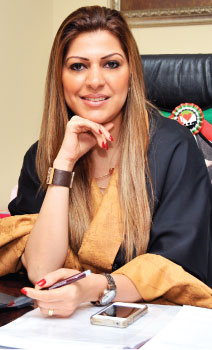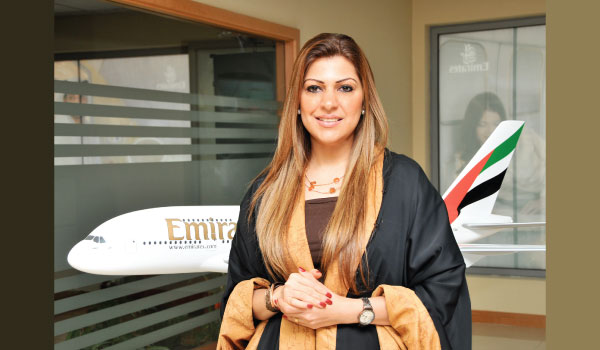She’s just been made one of only two UAE female country-wide managers for the prestigious Emirates airline and she shot up the ranks in record time. We spoke to Reema Al Marzooqi about what being a woman means for her career.
Reema Al Marzooqi cuts an impressive figure. She is an intensely beautiful and feminine woman, which makes it even more striking when you walk into her office to see her sitting behind a large mahogany desk with her computer and all her paperwork around her.
She is also a warm and welcoming woman, which makes talking to her about her role as Bahrain’s most senior permanent member of staff within the Bahrain section of the Emirates empire an interesting proposition. Her job comprises of overseeing everything that goes on in the Bahrain station in its entirety — including the sales and marketing, ticketing, legal and customer affairs divisions. So, as you can imagine, she has had to figure out just how to command the right level of respect and commitment from those around her.
“It was a very challenging proposition”, Reema says of being offered her new role. Emirates is a leading and ever growing airline. Like many other companies, it has had a tough time dealing with the recent financial year, but this hasn’t stopped plans for expansion. Emirates bought around 50 new Boeing 777s during the Dubai air show and currently has has an impressive 69 A380 double-deckers on order, adding to their already large collection of passenger planes. Ten years ago, they only had one daily flight out of Bahrain, but that number has since shot up to 21 a week, making Reema’s job considerably more complicated.
 As one of only two UAE national female country managers, Reema is acutely aware of the difficulties of being a trail-blazer. “This is such a male-dominant field”, she says, “So I feel very proud to be a woman in this office. There are, of course, obstacles that I face where a man wouldn’t. Sometimes it is hard to be taken seriously. You cannot command respect and trust by force.
As one of only two UAE national female country managers, Reema is acutely aware of the difficulties of being a trail-blazer. “This is such a male-dominant field”, she says, “So I feel very proud to be a woman in this office. There are, of course, obstacles that I face where a man wouldn’t. Sometimes it is hard to be taken seriously. You cannot command respect and trust by force.
I have needed to prove myself in order to gain the respect I require to do my job. I have carefully considered my targets and worked hard to achieve them, which means I can almost let the numbers speak for themselves.”
The sense of needing to prove oneself, to show that women are just as capable, is probably one of the many reasons why Reema was the best candidate for the job. As she says, “As women, we do have the feeling that we have more to prove; there is more of a point to make. This means that we commit to working harder, being more organised, taking more responsibility.”
There is an argument, though, that Reema’s concentrated need to prove something will mean that she has a tougher time than others might in the same position. “I try really hard never to complain”, she explains, “Because the moment that you do, there are people that will say, ‘Oh she is being spoilt’, or, ‘She is weak’ and they will blame it on your gender. It is for this reason that I have to be prepared to accept any challenge. If they want to move me to somewhere controversial or any country in general, I will say yes. I will go because I don’t want to show them that we cannot do it. We will go and we will make an example of ourselves.”
“I got this position by working to the same standards as anyone else.
I enrolled in the Management Outstation Training, which is rigorous. It is almost a two and a half year process, with training in a lot of different departments, because you will have to understand all of them to oversee them. There is a panel of senior Emirates employees to evaluate you every step of the way. You cannot move on if you do not meet their standards. You have to do presentations and pass tests.”
“After this, you are offered a middle-management position somewhere, in order to prove that you can handle a station posting later on. Many people spend three or four years at this level, but I was offered the Bahrain country manager position after about eight months.”
Like men and women all over the region are beginning to come to terms with, Reema is only too aware of the need to educate the Middle East’s female population. “I studied business administration at the American University of Sharjah and after this I decided to do two Masters: human resources with psychology and industrial relations, both at the University of Western Sydney.”
“I think my experience in Sydney was so important, for the education, but also for other reasons. Studying abroad means that you get to experience a different culture. Sydney is very cosmopolitan, so I met people from all over, which means that I now don’t have a problem being asked to work anywhere in the world. Women need education like this — it means that they learn to be independent, to think for themselves, to be stronger and to build up their individual personality.”
“I see education as a bomb or a weapon against any obstacle in life.
It gives you the ability to deal with all sorts of situations. Things might happen to us, but we won’t have to rely on someone else to support us, we can help ourselves out of problems and take responsibility for ourselves. It will also provide you with better relationships. Education gives you the ability to relate more and understand your partner better.”
Listening to such strong words, it seemed only fitting to ask Reema if she had any further advice for other women looking to climb the career ladder. “Women should keep the faith and never give up”, she says. “I really believe that if a man can do a thing one time, we can do it again and again, ten times better. Of course it isn’t easy, especially in this part of the world, even though now it has become further developed, but if we believe in ourselves, we can do anything. People might say that I am overly positive, but it is because of this attitude that I have reached where I am.”


































